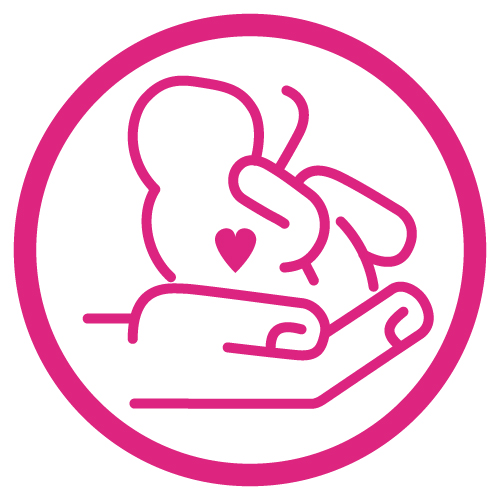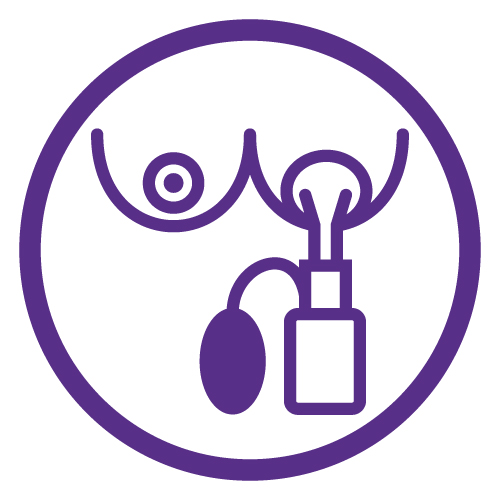 IBCLC Detailed Content Outline: Pharmacology and Toxicology Focused CERPs - Section IV
IBCLC Detailed Content Outline: Pharmacology and Toxicology Focused CERPs - Section IV
Access CERPs on Pharmacology and Toxicology for the IBCLC Detailed Content Outline recertification requirements. Enjoy convenient on-demand viewing of the latest Pharmacology and Toxicology focused IBCLC CERPs at your own pace.

"But You're Supposed to Be Happy!" Perinatal Mood and Anxiety Disorders

Marie Zahorick, MS, APRN, PMHNP-BC, FNP-C, IBCLC became a La Leche League Leader in 1999 and an IBCLC in 2005. After several years of working as a hospital-based bilingual Spanish-speaking IBCLC, she attended nursing school and eventually became a board-certified Family Nurse Practitioner. In the meantime, she continued working as a hospital-based lactation consultant doing inpatient, outpatient, and NICU lactation. She did not get much sleep.
After graduate school, Marie went to work in psychiatry and also did a post-masters certificate to became board-certified in psychiatry and mental health. She was fellowship-trained to manage patients in the acute inpatient setting, partial hospitalization, outpatient office, and OB patients in the general hospital setting.
She specializes in women's psychiatry, especially medical management of women who are pregnant or lactating. Her expertise also includes general psychopharmacology. She is experienced at diagnosing and treating mental conditions such as bipolar disorder, perinatal/postpartum mood and anxiety disorders, postpartum psychosis, obsessive-compulsive disorder, premenstrual and perimenopausal mood disorders, and personality disorders.
She lives in the Chicago area with her husband and three adult children in their 20s. Her children all breastfed for at least two years but now just make faces when confronted with that embarrassing fact.
Topic: Medications and Mothers' Minds: Psychopharmacology for Lactating Mothers - [View Abstract]
Perinatal mood and anxiety disorders (PMADs) include a spectrum of commonly-occuring mental health disorders. About 17% of postpartum mothers worldwide experience depression, with rates climbing to 60% in some low social-economic status women and adolescent mothers.
However, less well-known PMADs include perinatal panic disorder, perinatal obsessive-compulsive disorder (OCD), and perinatal post-traumatic stress disorder (PTSD). These often include very distressing intrusive or bizarre thoughts, behaviors, or flashbacks.
Perinatal bipolar disorder and postpartum psychosis are particularly dangerous due to severe depression, and reckless or bizarre behavior that can endanger mother and baby.
Women with bipolar disorder may have stopped medications during pregnancy and are experiencing mood instability. They may also not realize they have bipolar disorder and require careful diagnosis, since twenty-two percent of depressed women postpartum have bipolar depression. Postpartum psychosis is an emergency and occurs in 1 to 2 of every 1,000 deliveries. This requires immediate hospitalization for safety, due to a 5% suicide rate and 4% infanticide rate. The midwife is part of the safety net for postpartum mothers and is a vital first step for identifying possible PMADs and referring the mother for mental health treatment and support.

Advanced Postoperative Pain Management Strategies in the NICU

Teresa Puthoff, BS Pharm, PharmD, BCNSP received her professional degrees from the University of Cincinnati and The Ohio State University. She has over 30 years experience working in high risk delivery and referral centers. She currently works as an Advanced Practice Pharmacist in the NICU at Nationwide Children’s Hospital in Columbus Ohio. Her current professional passions are neonatal nutrition, developmental pharmacology, BPD, and analgesia and sedation management. She teaches PGY-1 and PGY-2 pharmacy residents as well as Neonatal Fellows in medicine, physical therapy and respiratory therapy. She has published on the use of regional analgesia in the NICU and is currently implementing the use of NCA and wound catheters for post op pain management as a part of ongoing efforts to reduce opioid and benzodiazepine use in the NICU.
There has been an evolution in knowledge regarding the consequences of untreated pain in the infant as well as the unintended long-term effects of providing systemic analgesics. Infants were often subjected to surgical procedures without analgesia until the landmark paper by Anand and Hickey demonstrated improved morbidity and mortality when proper anesthesia and analgesia were provided to infants undergoing surgical procedures. Early life stress and chronic pain has shown evidence of long-term adverse neurodevelopmental effects upto adulthood. An FDA Drug Safety Communication Alert advised practitioners that repeated or lengthy exposures to anesthetics and sedatives have the potential to have adverse effects on neurodevelopmental outcomes. Many anesthetics, benzodiazepines, and opiates act via NMDA (N-methyl-D-aspartate) receptor agonism, GABA (gamma amino butyric acid) agonism or both. Animal model studies have demonstrated neuro-apoptosis and subsequent cognitive impairments due to these drug-receptor interactions. Cumulative opioid exposure has been associated with adverse cognitive outcomes in former extremely low birth weight infants (ELBW). These concerns prompted many to pursue other pharmacologic modalities and surgical techniques to minimize the use of postoperative opioids. This lecture will discuss the use of Regional analgesia (RA) and Nurse Controlled Analgesia (NCA) in post operative infants in the NICU.


Ted Greiner received a PhD in nutrition for developing countries from Cornell University. For 19 years he worked as nutrition advisor for the Swedish International Development Cooperation Agency, based at Uppsala University where he was Associate Professor of International Child Health, helping to ensure their long-term support for IBFAN and WABA. Dr. Greiner was Professor of Nutrition at Hanyang University in South Korea for seven years. He has consulted for UNICEF, World Bank, FAO and others. He is now retired and edits the journal World Nutrition. He has lived in 8 countries and worked in 10 more. His areas of research expertise include infant feeding and programs to combat vitamin A, iron and iodine deficiency. In the 1970s, he did the first scientific work on the impact of baby food advertising on breastfeeding patterns. His PhD dissertation was on the planning and evaluation of a 1978-81 project to protect, support and promote breastfeeding in Yemen (terminology quickly adopted by UN agencies). Over the next decades, the duration of breastfeeding there doubled. During the planning the Innocenti meeting, he represented Sida, one of the 4 agencies involved. He was active in changing how WHO viewed HIV and infant feeding. He has over 100 breastfeeding-related publications.
Moderate alcohol use by breastfeeding women appears to be relatively common. Alcohol concentrates in breast milk at levels similar to maternal blood, peaking at 30-60. Most studies find no link with the duration of breastfeeding. However, seven studies have found a link with a shorter duration of exclusive breastfeeding. Alcohol affects oxytocin release, leading to reductions in breast milk consumption in the following hours and reduces infant sleep, both temporary if the mother does not continue to drink. These effects on the infant and the breastfeeding process could be interpreted by mothers as signs of infant dissatisfaction with their breast milk, “insufficient milk,” or other causes for premature supplementation. Chronic alcohol consumption may have a number of more serious effects, including on infant development, but research is limited. Younger infants tolerate alcohol worse, so abstention or avoidance of infant exposure for the first months of breastfeeding may be wise. Messages to mothers on this issue are conflicting, confusing and often outdated. Too little is done to teach mothers how to reduce infant exposure. Research is needed in different cultures into whether various forms of cautionary messages are likely to discourage breastfeeding.

An Evidence-Based Guide to Using Domperidone as a Galactagogue

Associate Professor Luke Grzeskowiak is a clinical pharmacist and Practitioner Fellow in the College of Medicine and Public Health at Flinders University and the South Australian Health and Medical Research Institute, Australia. He is passionate about improving health outcomes for mothers and babies through the development and promotion of more effective and safer approaches towards medicines use. Luke has been undertaken research involving the use of domperidone for 10-years. He is currently the lead investigator on a number of projects examining the use of domperidone to increase breast milk supply in clinical practice, predictors of treatment response to domperidone, and causes of low breast milk supply. He is also the lead investigator on a large clinical trial comparing the effects of different doses of domperidone in the treatment of lactation insufficiency. He has published widely on the topic of treatment for low breast milk supply, with many of these publications cited in clinical practice guidelines locally and internationally.

Antibiotics in the NICU: Practical Understanding of Bugs & Drugs

I have been working in the neonatal area for about 40 years. I received my BSN from Grand Valley State University in Grand Rapids, Michigan. I began working in the NICU right after graduation at Bronson Methodist Hospital in Kalamazoo, MI. I then moved to Detroit and worked at Henry Ford Hospital for 7 years as an RN, Perinatal Educator, Clinical Nurse Specialist, and NNP. I completed my MSN at Wayne State University. I was the first NNP in Michigan, and after leaving Henry Ford, I started working at St. Joseph’s Hospital in Ann Arbor. We moved to Arizona in 1985. I worked at St. Joseph’s Hospital & Medical Center in Phoenix and Banner Desert Medical Center in Mesa (including time at other Banner facilities at Baywood, Mesa Lutheran, and Thunderbird). I completed my PhD at the University of Arizona in Tucson in 2005, and moved to Omaha, NE to begin teaching in the NNP program at Creighton University. I have continued to work most weekends in the NICUs at Methodist Women’s Hospital, Creighton University Medical Center, Lakeside Hospital, and Bergan Mercy Medical Center (CHI Health). I love both teaching and the clinical aspects of the NNP role. I love working with students and helping them “get” the connection between physiology and the disease. I also get a “kick” out of attending deliveries, bagging infants, and intubating them!! I love that adrenaline rush! I also enjoy biking, reading a good novel, and enjoy roller blading (until I broke my leg 4 years ago). I have been pretty cautious with my roller skating since then. I have two sons – one in college and one who recently graduated from college and is working in downtown San Francisco. My husband and I love to travel (when I get time off) and have done some kayaking on the beautiful Nebraska lakes.
This talk will discuss the bacteria seen in the NICU and the groups of antibiotics that are used to treat them, differentiating between empiric therapy and directed therapy. The antibiotics covered will be penicillins, cephalosporins, aminoglycosides, macrolides, carbapenems and vancomycin. Antibiotic resistance patterns and possible new therapies will also be discussed.


Demetria Clark is the Director of Heart of Herbs Herbal School founded in 1998, www.heartofherbs.com. She has been an internationally known herbalist and aromatherapist for over 20 years. Training thousands of practitioners and working with organizations all over the world to promote wellness and self-sustaining careers.
For health care officials aromatherapy is becoming a tool many clients and patients are relying on, learn what can be used to support clients and patients safely. Often with any sudden popularity with a modality unsafe practices can be found and safe information needs to be available to health practitioners. Learn what essential oils and aromatherapy is and how you can explore the health benefits of this modality with your clients.

Balancing Beneficence, and Prevention of Harm When Caring for Pregnant Women with Substance Use Disorder

Liz Stokes JD, MA, RN, is the Director of the American Nurses Association Center for Ethics and Human Rights. She completed her BSN at the University of Virginia and worked several years as a critical care nurse. Liz received her Juris Doctor from the University of Richmond and worked as a Consultant for the D.C. Board of Nursing interpreting and conferring professional ethics provisions in nursing. She recently completed her Masters in Bioethics from Loyola University Chicago. Her leadership is also demonstrated through various charitable roles in the health and legal communities. She is a member of The American Association of Nurse Attorneys and serves on the board of the American Society for Bioethics and Humanities Affinity Group for Nursing. Liz also serves as an Associate Editor for the Journal of Bioethical Inquiry and is an active volunteer with the District of Columbia Bar Association. Liz is currently an American Academy of Nursing Jonas Health Policy Scholar.
It is well established that the care of pregnant or postpartum women with substance use disorder(SUD) can be a source of work-related stress for clinicians (Maguire, Webb, Passmore, & Cline, 2012). Providers must balance the ethical principle of beneficence, or preventing harm, with fidelity, which requires fairness, truthfulness, and advocacy (ANA, 2015). This can be a challenge for clinician who are in positions where there is a mandatory requirement to report a pregnant woman’s substance use. In these situations, clinicians must be compassionate, truthful, forthcoming and transparent when communicating obligations with patients to maintain trust in the patient-provider relationship. This discussion will provide recommendations for compassionate care for women with SUD including education on mental health, SUD, interpersonal violence, and treatment options (Hill, 2013). As patient advocates, clinicians can be a strong voice for pregnant women with substance use disorder and their unborn babies (Ferszt, Hickey, & Seleyman, 2013).

View Details / Enroll

Beyond Fenugreek: An Individualized Approach to Dietary and Herbal Galactagogues

Melissa Cole, MS, IBCLC, RLC is a board certified lactation consultant, neonatal oral-motor assessment professional, and clinical herbalist in private practice. Melissa has been passionate about providing comprehensive, holistic lactation support and improving the level of clinical lactation skills for health professionals. She enjoys teaching, researching and writing about wellness and lactation-related topics. Melissa holds a bachelor of science degree in maternal child health and lactation consulting and her master’s work is in therapeutic, clinical herbalism. Melissa actively conducts research and collaborates with several lactation and health care professional associations. Before pursuing her current path, Melissa’s background was in education and cultural arts, which has served her well in her work as a lactation consultant and healthcare educator. She loves living, working and playing in the beautiful Pacific Northwest with her 3 children.
Topic: Beyond Fenugreek: An Individualized Approach to Dietary and Herbal Galactagogues - [View Abstract]
Topic: Beyond the Basics of Latch: Support Strategies for Helping Babies when the Basics Aren’t Enough - [View Abstract]
Topic: Common Infant Digestive Health Concerns and Useful Support Strategies - [View Abstract]
Topic: Connection and Care: Virtual Support for Tongue-Tied Infants - [View Abstract]
Topic: Feeding is Movement: Activities for Supporting Optimal Infant Oral Function - [View Abstract]
Topic: Infant Gut Health: Common Concerns and Useful Support Strategies - [View Abstract]
Topic: Infant Oral Assessment: Exploring Anatomy and Function Beyond the Frenulum - [View Abstract]
Topic: Low Milk Production Detective Work: Assessment and Care Plan Considerations - [View Abstract]
Topic: Nature’s Nurturers: Plant Medicine for Perinatal Mental Health - [View Abstract]
Topic: New Thoughts on Infant Pre and Post-Frenotomy Care - [View Abstract]
Topic: Placenta Medicine as a Galactogogue: Tradition or Trend? - [View Abstract]
Topic: Thinking Critically About the Use of Clinical Lactation Tools - [View Abstract]
Topic: Will It Hurt? Frenotomy Aftercare Strategies to Optimize Healing Outcomes for the Newborn - [View Abstract]
While some clinicians might roll their eyes when ‘lactation cookies’ are mentioned we know foods and herbs have long been used to nourish the postpartum parent and enhance lactation. Some topics this talk aims to cover: Does nourishment matter when it comes to breastmilk quality or quantity? How can we approach galactogogues for lactating mothers in an individualized way? How can clinicians evaluate evidence and determine safety regarding galactogogues? We know that parent coping with milk supply concerns are often desperate to ‘try anything’. Clinicians have an important role in helping families understand the risks and benefits of galactogogues. By helping parents identify resources and information around foods and herbs, we can help empower them to make informed choices.

Breastfeeding and Neonatal Abstinence Syndrome

Amber Valentine is a Speech-Language Pathologist who graduated from the University of Kentucky with her MS in Communication Disorders. She is a Board Certified Specialist in Swallowing and Swallowing Disorders and an International Board Certified Lactation Consultant, as well as a Certified Neonatal Therapist (CNT). She worked for Baptist Health Systems, Inc for 8 years before moving to Florida where she worked for Wolfsons Children’s Hospital and Mayo Florida. She is now back in Kentucky working for Baptist Health Lexington. She has experience in adults and pediatrics with feeding and swallowing difficulties including: bedside swallow evaluations, Modified Barium Swallow studies, FEES, and pediatric feeding evaluations including NICU. She has experience with head and neck cancer patient including evaluation and treatment of swallowing difficulties, PMV use, and voice after total laryngectomy including TEP. She has provided guest lectures for the University of Kentucky, Eastern Kentucky University, and the University of Louisville on feeding and swallowing topics. She has presented at the hospital, local, state, national, and international levels on pediatric feeding/swallowing and breastfeeding.
Topic: Breastfeeding Medically Complex Infants in the Neonatal ICU - [View Abstract]
Topic: Building a Successful Breastfeeding Program in the NICU: Challenges and Practical Solutions - [View Abstract]
This presentation is designed to discuss the role of feeding therapy, breastfeeding, and family dynamics with infants with neonatal abstinence syndrome. These baby/family dynamics can be complex situations and feeding difficulties are extremely common. Breastfeeding education/information can be implemented prior to birth along with other education for families to promote more infant/family bonding and reduce stress of being born in substance exposure. Breastfeeding dramatically reduces stress signs in infants exposed to substances neonatally. Working together as an interdisciplinary team, we can set these families up for more successful feeding opportunities and decreased stress in developmental care.

View Details / Enroll


Katrien Nauwelaerts graduated as a prehistoric archaeologist in 2005. She's the mother of three breastfed children and the administrator of the Dutch breastfeeding-website Borstvoeding Aardig, https://borstvoeding.aardig.be. Katrien worked as a volunteer breastfeeding-counsellor, provincial coordinator and training manager for the Belgian breastfeeding organisation Borstvoeding vzw between 2010-2014. Up tot 2018 she was the founder and president of Aardig Leven vzw, a non profit ecological organisation. In 2013 she became an IBCLC. Since 2013 she's working as a lactation consultant at her own private practice Borstvoeding Aardig. She became a nutritionist and a herborist in 2014. Katrien shares her experiences and knowledge on lactation consulting as a public speaker since 2014.
Topic: Breastfeeding and The Use Of Herbs - [View Abstract]
Topic: Young Mothers and Breastfeeding in Belgium - [View Abstract]
The medical use of herbs is as old as mankind. In this lecture IBCLC and herborist Katrien Nauwelaerts explains the difference between the regular medical approach of breastfeeding problems and the more holistic solutions used in phytotherapy. Katrien Nauwelaerts explains how the use of herbs can support and sometimes even replace the more traditional clinical treatment of breastfeeding problems such as postpartum depression, low milk supply, oversupply, engorgement, breast infection, plugged ducts, mastitis, candidiasis, thrush, and Raynaud Syndrome etc.






















